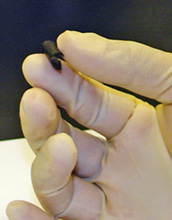|

Press Release 07-101
Origami Electronics?

Using carbon nanotubes, researchers turn ordinary wood-pulp paper into flexible, resilient batteries
August 14, 2007
By weaving black carbon nanotubes into paper, engineers have created printable, flexible batteries that are more resilient than many existing batteries, yet can be cut, folded and worked just like paper. The rechargeable material could find uses in a range of devices, from portable electronics to automobiles.
Researchers from NSF's Nanoscience and Engineering Center for Directed Assembly of Nanostructures at Rensselaer Polytechnic Institute in Troy, N.Y., reported the new technology in the Aug. 13, 2007, Proceedings of the National Academy of Sciences.
In addition to withstanding a temperature range extending from minus 70 degrees Celsius to nearly 150 degrees above zero, the new batteries are capable of providing both the constant output of a standard battery and the sudden energy bursts of supercapacitors.
Because almost any liquid salt can serve as the electrolyte, the researchers demonstrated that substances found in sweat, blood and urine can help power the battery, making the system ideal for medical applications.
Additional information is available in the RPI press release:
http://news.rpi.edu/update.do?artcenterkey=2280
-NSF-

Media Contacts
Joshua A. Chamot, NSF (703) 292-7730 jchamot@nsf.gov
Michael Mullaney, Rensselaer Polytechnic Institute (518) 276-6161 mullam@rpi.edu
Program Contacts
David L. Nelson, NSF (703) 292-4932 dnelson@nsf.gov
Principal Investigators
Robert Linhardt, Rensselaer Polytechnic Institute (518) 276-3404 linhar@rpi.edu

The National Science Foundation (NSF) is an independent federal agency that
supports fundamental research and education across all fields of science and
engineering, with an annual budget of $6.06 billion. NSF funds reach all 50
states through grants to over 1,900 universities and institutions. Each year,
NSF receives about 45,000 competitive requests for funding, and makes over
11,500 new funding awards. NSF also awards over $400 million in
professional and service contracts yearly.
 Get News Updates by Email Get News Updates by Email
Useful NSF Web Sites:
NSF Home Page: http://www.nsf.gov
NSF News: http://www.nsf.gov/news/
For the News Media: http://www.nsf.gov/news/newsroom.jsp
Science and Engineering Statistics: http://www.nsf.gov/statistics/
Awards Searches: http://www.nsf.gov/awardsearch/
| 

